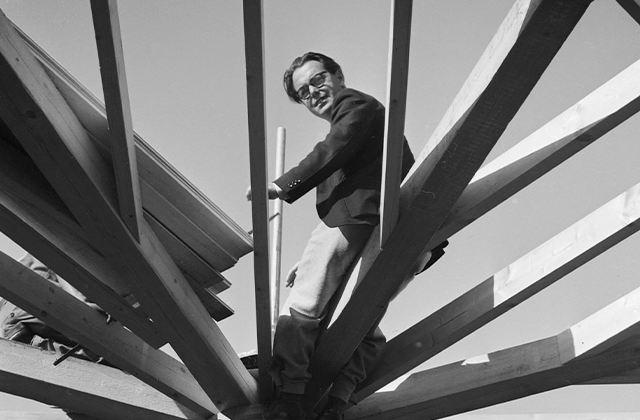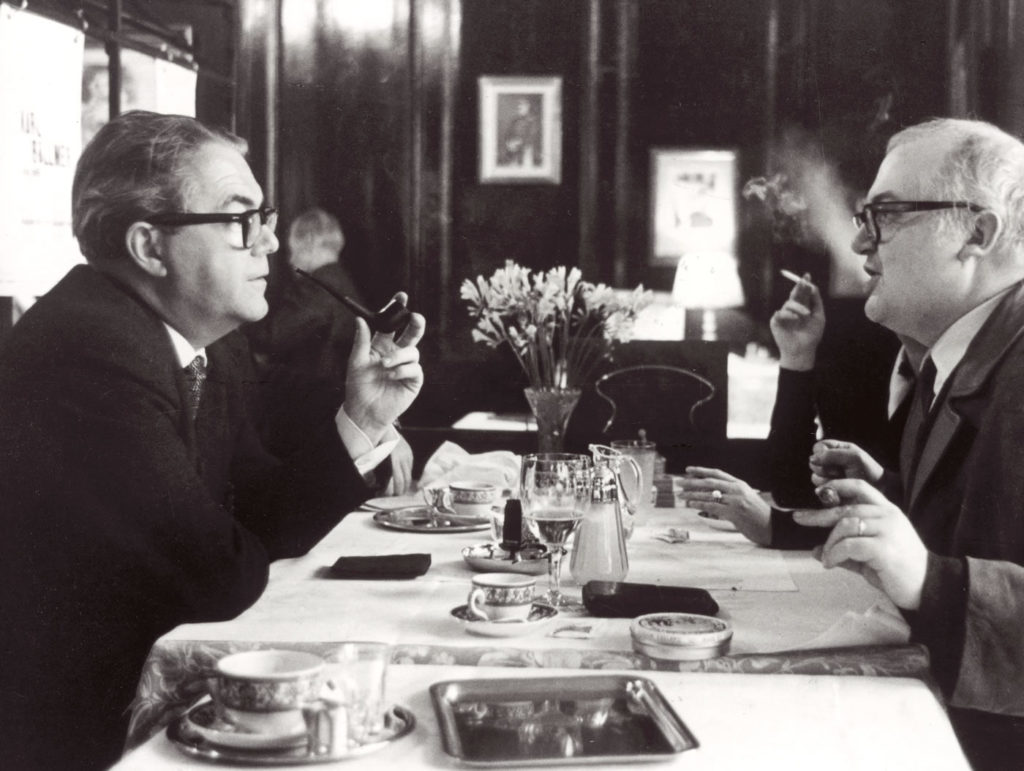Ironic and committed, romantic and individualistic, contentious and polemical, he was an intellectual sensitive to his times and to questions of personal identity. This is the life story of Max Frisch, the man with the Duras glasses, the Dali eyebrows and the Magritte pipe.
Deeply rooted in his own time, Max Frisch experienced the 20th century almost in its entirety. Born in 1911 and dying in 1991, he followed the world from his native Switzerland, from his travels and from the words of those he met along the way. But let’s retrace his multi-faceted life, with its nuanced relationships with his own protagonists.
Writing, part one
Born in Zurich, Max Frisch grew up in an atmosphere influenced both by the work of his architect father and the family’s artistic heritage on his mother’s side. He began his literary studies at the University of Zurich in 1930. The death of his father a few years later forced him to leave school for financial reasons. He then turned to journalism. As a reporter for the Neue Zürcher Zeitung, the young man ventured beyond Switzerland’s borders. He discovered a world immersed in the inter-war years. During this period, Max Frisch also published his first novel, Jürg Reinhart: Eine sommerliche Schicksalsfahrt. Was he born a writer? Not really. Not judging himself talented enough, he abandoned the literary path and turned to architecture, his father’s field.

He enrolled at the Swiss Federal Institute of Technology Zurich (ETHZ) and, after graduating, set up his own architectural practice. In 1942, he triumphed over 80 competitors in a competition to design a public swimming pool. Built in 1949, it still exists in Zurich, now under the name Max Frisch Bad. At the same time, the future playwright continued to write, leading a double life for some fifteen years. He also widened his circle of acquaintances, frequenting Bertolt Brecht, Peter Suhrkamp, Friedrich Dürrenmatt and other intellectuals of the time.
And he tried again to break into the literary world with the publication of his diary Tagebuch 1946-1949. A first success, this work will go down in history as a silent witness to the social, artistic and political revolutions of those years. The author takes an uncritical, unbiased look at his own world. This position of neutrality was to evolve over the course of his life.
Max Frisch abandons architecture for writing. It’s a turning point, a new life.

« At one time or another, each of us invents a story that we take to be our life. »
Max Frisch
Writing, part two
A new stage begins for Max Frisch. A series of cities, encounters, women, projects and internal questions, which he may or may not put down on paper.
Although he reworked his first novel with the bilingual title Die Schwierigen, oder J’adore ce qui me brûle, it was Stiller, published in 1954, that gave his career an international turn. The author not only won over the public, but was also praised by his peers, notably with the Georg Büchner Prize, the crowning glory of German literature. The subject? A man is arrested at the Swiss border on suspicion of using false papers. But what is his real name? If he is identified by the authorities and those who knew him as the sculptor Anatol Stiller, who disappeared a few years earlier, he repeats “I am not Stiller”. Could this be the explanation for his sudden departure, his exhaustion with the life he was leading, the reason for his break with his former relationships, his need to free himself from his past life to open a blank page? He tells stories, perhaps imaginary ones, to avoid (or no longer) being attached to the Stiller he’s always being told about. He no longer wants to be Stiller, to be their Stiller, a role that suits those around him, but from which he has so long wanted to separate himself. Finally, with this change of life in the ’50s, isn’t Max Frisch drawing Stiller’s torments from his own experience? Surely not, for as his protagonist says: “You can tell everything, except your real life”.
The red thread of the double face between the self and the mask imposed by society, as well as geographical wandering and identity, would weave his next works and characters. And success followed success, whether in novels such as Homo faber (1957), in which the protagonist attempts to dethrone chance in favor of rationalizing the world with mathematical calculations, or Mein Name sei Gantenbein (1964), whose protagonist invents different lives and roles to escape his reality, Barbe-Bleue (1982), whose hero suffers the consequences of his public image on his “self”, or plays, including Andorra in 1961, which deals with anti-Semitism, or Biography: Ein Spiel (1967), which presents life as a chess board.

« Why do I write? To write! To endure the world, to resist, to stay alive »
Öffentlichkeit als Partner, MAX FRISCH
« Max Frisch, Citizen »
As a writer and intellectual, Max Frisch is always at the center of events. He was invited by Henry Kissinger to the White House to discuss the Vietnam War, met German Chancellor Helmut Schmidt in China, and exchanged views with Uwe Johnson and Günter Grass, even though he lived in West Berlin. His view of the GDR and his reflections on current events during this period are recounted in the pages of his Berlin Diary 1973-1974. Gradually, his opinion on the role of the writer evolved. He would say: “Sometimes, I myself am of the opinion that any book that is not dedicated to preventing war and creating a better society and so on, is pointless, vain, irresponsible, boring, unworthy of being read, inadmissible”.

A patriotic intellectual in his early days, a writer sensitive to the evolutions of his time, an author swinging in that duality between individualism and political observation, an engaged citizen on Swiss political issues, a human being whose choices were comparable to those of his characters, but who told everything “except his real life”, Max Frisch remains a multi-faceted enigma. “Those who study Frisch’s life have the impression of never having known him. He discovers a being in constant conflict with himself,” wrote Julian Schütt, after devoting over fifteen years to a biography of the famous Zurich writer.
« Does a writer believe today that he might still be read a hundred years from now? »
Max Frisch
